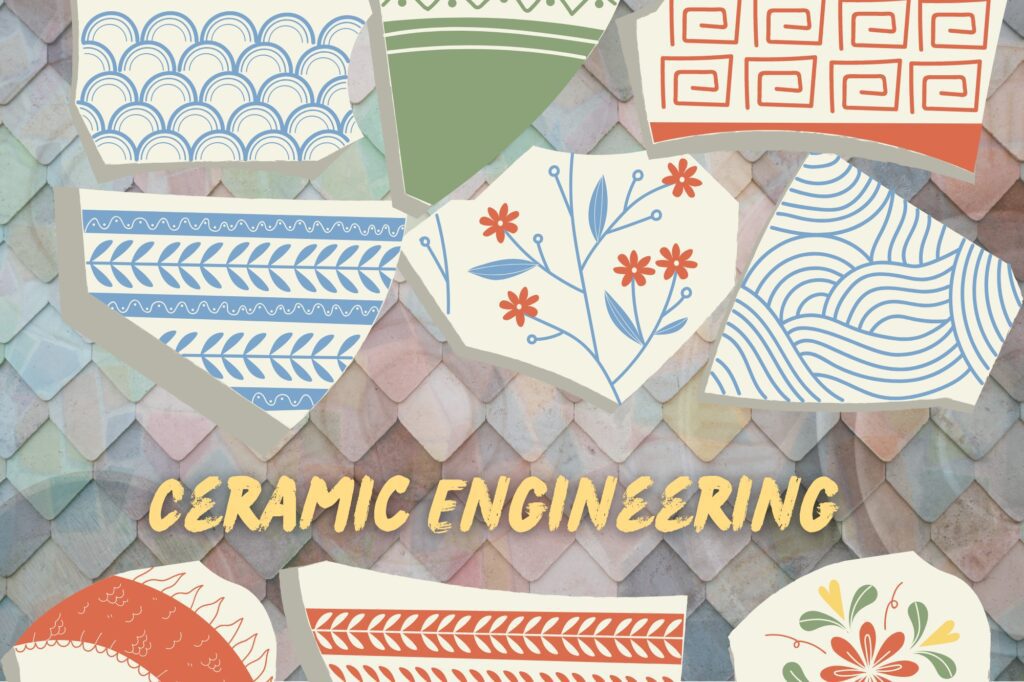Introduction to the Field of Ceramic Engineering
Ceramic engineering focuses on designing, manufacturing, and processing ceramic materials. Ceramics are materials composed of non-metallic elements, such as silicon, oxygen, carbon, aluminium, and other elements. In India, ceramic engineering has become increasingly important due to its applications in various industries such as automotive manufacturing, aerospace engineering, medical devices and prosthetics production, electronics manufacturing, and more.
Overview of the Application of Ceramic Engineering
Ceramic engineers work to develop materials that possess unique properties such as strength and heat resistance. They also experiment with different combinations of materials. Becoming a ceramic engineer requires knowledge of material science and chemistry and an understanding of how to use tools like CAD (Computer Aided Design) software to design products. Ceramic engineers are often employed by companies in the automotive industry, where they work on developing new components for cars or improving existing ones. They may also create parts for aircraft engines or medical devices.
Ceramic engineers can also work on projects related to environmental protection by researching ways to reduce waste or use recycled materials. In addition to these traditional application areas, ceramic engineering has also been used in recent years to develop innovative products designed specifically for India’s growing population. For example, electric vehicles require advanced ceramics for production, created by Indian ceramic engineers working in collaboration with foreign companies.
How to Become a Ceramic Engineer
1. Step 1: Complete an Undergraduate Degree in Ceramics
The first step towards becoming a ceramic engineer is to complete an undergraduate degree in ceramics or related fields such as materials science or engineering. Many institutions in India offer undergraduate programs in ceramics or associated areas. You will learn manufacturing processes, material properties, and design principles through that.
2. Step 2: Pursue Postgraduate Studies in Ceramics
After completing your undergraduate degree, you may pursue postgraduate studies in ceramics. Postgraduate studies are more specialized than undergraduate courses and allow you to gain expertise in specific areas of ceramic engineering. Common postgraduate courses include advanced manufacturing techniques, composite materials, and product design.
3. Step 3: Get Certified as a Ceramic Engineer
To be recognized as a professional ceramic engineer, you must obtain certification from the Indian Institute of Ceramics (IICERAM).
Tips for Success as a Ceramic Engineer
1. Develop Technical Knowledge
To become a successful ceramic engineer, you must possess technical knowledge and expertise. You should be proficient in ceramic engineering, from materials science, manufacturing processes, and product design to testing and quality assurance.
2. Gain Experience
Gaining as much practical experience as possible in the field is essential. Take on internships or short-term projects related to ceramic engineering so that you can learn the ropes and better understand what it takes to succeed in this profession.
3. Network With Experts
Don’t underestimate the importance of networking when becoming a successful ceramic engineer. Reach out to experts in your chosen field and build relationships that can help you advance your career.
4. Stay Up to Date
The world of ceramic engineering is constantly evolving. Ensure you keep up with technological advances and new research findings related to your area of expertise.
Career Paths and Job Prospects for Ceramic Engineers
India has several industries that require the expertise of ceramic engineers. Ceramic engineering involves studying and applying materials science, engineering principles, and manufacturing processes to create products from ceramic materials. Ceramics are used in many industries, such as construction, electronics, medical devices, automotive, aerospace, and more. Ceramic engineers can specialize in either production or design. Production ceramists typically work in factories or laboratories and ensure that the final products adhere to specifications.
Design ceramists work on product development from conception to completion. They research new materials and develop designs that meet customer requirements. Regarding job prospects for ceramic engineers in India, plenty of opportunities are available.
Companies across various sectors, such as automotive, medical device manufacturing, electronics manufacturing, construction material suppliers, and others, often hire ceramic engineers for specific projects or roles within their organizations. Additionally, universities and research institutes often have openings for ceramic engineers who specialize in academic research or teaching positions. Overall, becoming a ceramic engineer requires extensive knowledge and experience in the field of ceramics as well as an understanding of materials science and engineering principles.



